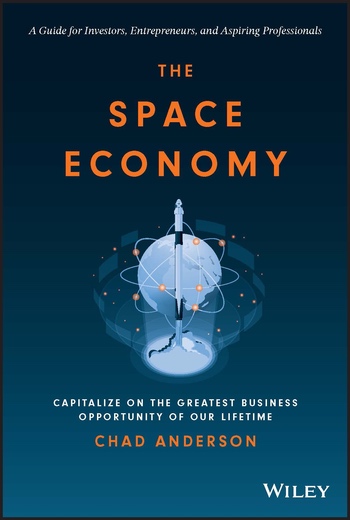Review: The Space Economyby Jeff Foust
|
| The book lays out that thesis primarily for those new to the industry, that innovations like more frequent, lower cost launch enable new businesses that can use space in novel ways. |
At this juncture, a book trumpeting the promise of the space economy might seem poorly timed. But Chad Anderson, the founder of space-focused investment firm Space Capital, would probably take the long view, seeing the current troubles as a speed bump slowing down the industry but not refuting the argument he makes that there is still tremendous potential for startups to use space to create new businesses.
The Space Economy lays out that thesis primarily for those new to the industry, that innovations like more frequent, lower cost launch enable new businesses that can use space in novel ways, creating a growing space economy (or Space Economy, as Anderson refers to it throughout the book.) For all the attention that launch and new markets like space tourism get, though, he estimates that more than 90% of the value of the industry is in the satellite sector, which includes navigation, geospatial intelligence, and communications. Within those verticals are three layers—infrastructure, distribution, and applications—that he describes in detail in the book.
That results in an expansive definition of the space economy in the book: in navigation, the applications tier includes companies like DoorDash and Uber because they use space-based navigation services. “We believe that any technological product or service that depends on orbital access in some way belongs under this umbrella,” he argues. Most of the companies that he profiles in the book are more conventional space companies, though, from Earth imaging company Planet to space situational awareness company LeoLabs.
| The book is really a primer on the space industry and its potential, just enough, perhaps, to convince someone curious enough about it to read the book to conclude that there is some potential for growth. |
The book is largely an introductory guide for would-be space entrepreneurs and investors alike, highlighting issues and pitfalls for early-stage companies. Some of the advice is generic to technology companies or even any company, like figuring out who is the customer for a new business or recruiting employees. But he also offers some space policy background to help newcomers better appreciate how the space industry evolved into its current state.
While the book focuses on the satellite sector, he does look at emerging industries such as space stations, lunar mission, space logistics and industrial activity in space: those sectors, he concludes, are still far off, but “ignore them entirely only at your peril.” There is far less about the launch sector, beyond emphasizing the role SpaceX played in opening up space access and looking ahead to Starship.
The Space Economy is really a primer on the space industry and its potential, just enough, perhaps, to convince someone curious enough about it to read the book to conclude that there is some potential for growth. So long, perhaps, as you don’t start or invest in a launch company.
Note: we are using a new commenting system, which may require you to create a new account.
